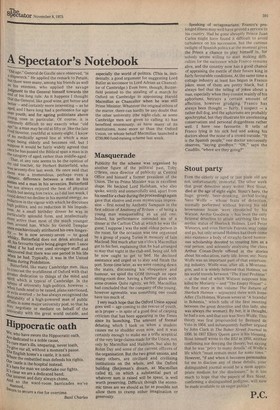A Spectator's Notebook
Old age," General de Gaulle once observed, "is a shipwreck." He applied the remark to Petain, but there were many, among his friends as well as his enemies, who applied the savage judgment to the General himself towards the end of his long rule. As it happens I thought that the General, like good wine, got better and better — and Certainly more interesting — as he aged, and I have long had a preference for age over youth; and for ageing politicians above Yuung ones in particular. Of course, it is extremely difficult to say exactly what "old age" is: a man may be old at fifty or, like the late Fred Streeter, youthful at ninety-eight. I know of no medically agreed line at which a man stops being elderly and becomes old, but I suppose it would be fairly widely agreed that once he has passed the Biblical span a man is in the category of aged, rather than middle-aged. That, at any rate seems to be the opinion of rnY old teacher, Sir Herbert Butterfield, who Was seventy-five last week. He once said that there was a tremendous, perhaps even a climatic, difference between a man in his sixties and a man in his seventies. Butterfield has not always enjoyed the best of physical health but seeing him twice, as I did last week. I could detect no decline in his mental energy, no reduction in the vigour with which he discusses high politics, and no reduction in his impishness. At a small birthday dinner he was in Particularly splendid form, and intellectually more active than most of the much younger men around him. While Sir Gerald Templar ?nee mischieviously attributed his own longev 1t5'' he is now seventy-seven — to good Whisky, Butterfield does not drink alcohol at all, his favourite tipple being ginger beer. I once asked if he had ever used stronger stuff and discovered that there was one period in his life Ivhen he had. Typically, it was in the United States during Prohibition. Butterfield, like many Cambridge men, likes "? Contrast the worldliness of Oxford with that greater dedication to things of the mind and slairit which is typical of Cambridge. In the sPhere of university high-politics, however — N4'hen funds need to be raised, plans sanctioned, or evils averted — he has always recognised the• esirability of a 'high-powered man of public affairs in some major university post, so that he MaY negotiate or mediate on behalf of the university with the great world outside, and
especially the world of politics. (This is, incidentally, a good argument for suggesting Lord Butler as successor to Lord Adrian as Chancellor of Cambridge.) Even here, though, Butterfield pointed to the stealing of a march by Oxford on Cambridge in appointing Harold Macmillan as Chancellor when he was still Prime Minister. Whatever the original ethics of the matter, there can hardly be any doubt that the other university (the night-club, as some Cambridge men are given to calling it) has benefited enormously, as have many of its institutions, none more so than the Oxford Union, on whose behalf Macmillan launched a £750,000 fund-raising scheme last week.
































 Previous page
Previous page